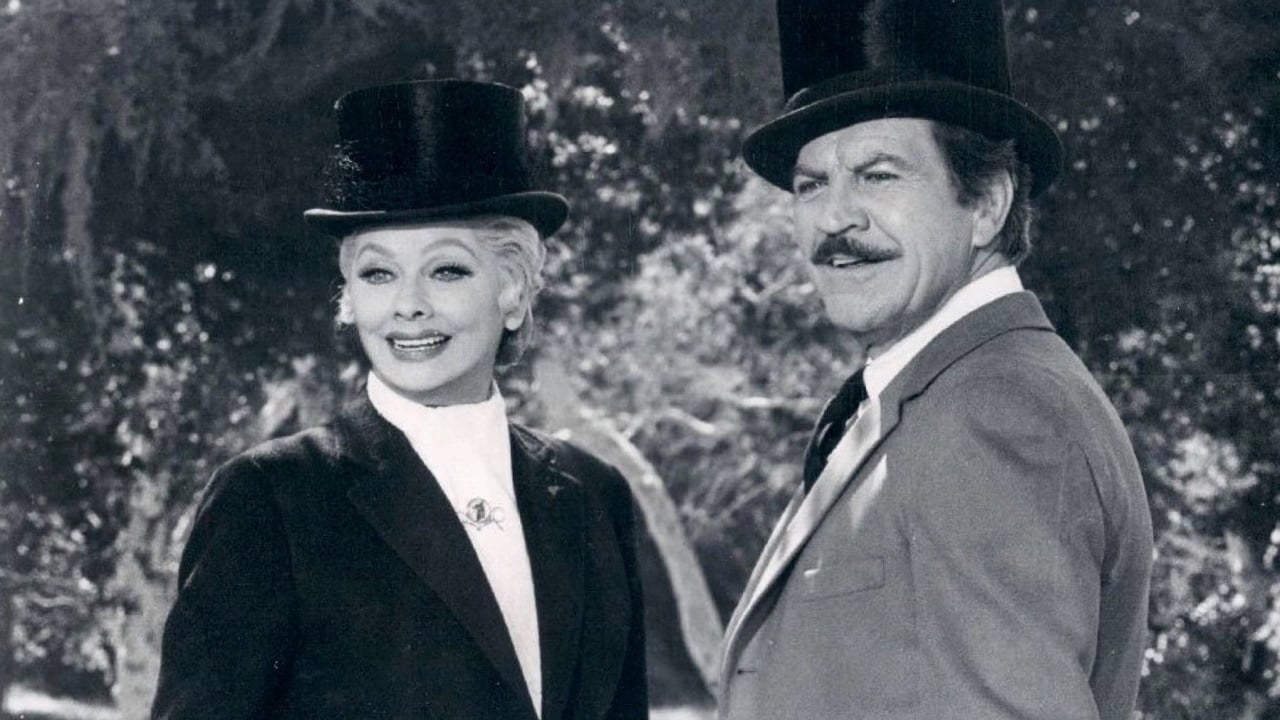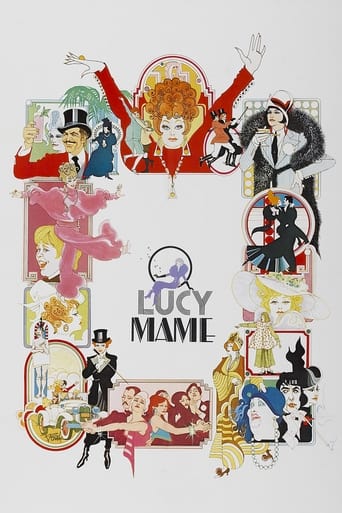

Movie version of a hit Broadway musical. In the 1920s Mame (Lucille Ball) a "free spirit" has to bring up young Patrick (Kirby Furlong) an orphaned nephew. He is introduced into her freewheeling lifestyle and grows into a conservative jerk (Bruce Davison) who's somewhat ashamed of his aunt. Robert Preston also pops up and Beatrice Arthur is hysterical as Mame's best friend.OK--Ball can't sing and she's at least 10 years too old for the role--but I still loved it! Lavishly produced with beautiful settings and costumes. The songs are great and I was never bored. Ball, again, can't sing but her acting was right on target. A neglected gem.
... View MoreLucille Ball stars as Mame, an eccentric, avant-garde New Yorker who suddenly becomes the guardian of her orphaned nephew. She opens new vistas for the boy but when the Depression hits, she finds herself a shop clerk. Luckily, one of her first customers is a handsome, wealthy, and single Southern gentleman (Robert Preston).First of all, this is the Worst Movie Ever; not funny bad, but miserably awful in every way. When the story opens, Mame is about 42, but Lucy's 62, looks 72, and sounds 82. Her voice is so low and gravelly, she sounds like Foghorn Leghorn and is about as subtle. When she smiles, she has a frozen leer on her face that makes her look like a mummy, even with the ridiculous soft-focus lens that fools no one. From her first scene, she has no warmth or heart, nothing about her that would make a little boy love her, let alone her hoards of minions.Bea Arthur plays Mame's best friend, but she's made up to look like an ugly man. She and Lucy have no chemistry at all and their witty repartee falls flat.The story moves way too quickly in order to fit in all the songs which are slow and dreary; they could have been saved if Lucy would sing, but she can't. Mame's wardrobe is stylish and striking, but Lucy seems to be posing like a wax figure in them, rather than actually being a fabulously charismatic woman. Watching this movie just makes one remember how much better Rosalind Russell was in the original, non-musical version.
... View MoreI can quote the lines from "Auntie Mame" pretty much from beginning to end, even though it was this version that I first saw on its TV premiere in the mid 1970's. I was a young, unsophisticated pre-teen at the time, so I thought it was sensational. That, on top of having the original Broadway cast recording, made this one of my first favorite Broadway musicals. Then, I was introduced to "Auntie Mame", and after reading about what a flop this one was, I snootily began to dismiss it myself, even though I enjoyed the musical selections I would see from time to time in nightclubs that specialized in showtune videos.25 years after giving this a ** (out of ****) rating, I have re-discovered it, and found much to appreciate, if not rave about it. Rosalind Russell, as Auntie Mame, became alive to me in this part, and hearing Angela Lansbury on the Broadway cast album made me think that nobody but those two people could play this part successfully (with the exception of a few of Lansbury's replacements). I have seen several productions of each version, and have to admit, it is a difficult role to play, mainly because the memory of those two performances is difficult to erase. The problem with Lucy's version is not only that she was about 10 years too old to play the part (and couldn't sing), it was the fact that she is begging for the audience's acceptance, and that takes away from the spontaneity of her performance. There are moments when she allows herself to relax in the part, and is indeed as good as her predecessors. However, in a few sequences, you forget she's playing this elegant NY matron with a lust for life as she sinks back into Lucy Ricardo, Carmichael, or Carter, such as hobbling about with one roller skate on, or being stuck to her horse during the foxhunt. The overusage of hugs, too, makes Lucy's desire to get the audience's approval slightly unbearable, as does the unnecessary use of flashbacks towards the end.Beatrice Arthur perfectly recaptures the role of Vera Charles, and when she says "pity" to the identification of Gloria Upson, it is pure elegant bitchery, like Tallulah Bankhead would have done. Jane Connell is fun, if a bit late in the game to be believable as Gooch, and the overabundance of her big belly when she comes back pregnant is too much. Thank God though they kept in Gooch's song. Robert Preston is simply divine. I can't think of anybody better to portray Beaugard, especially since he was preparing to star in Jerry Herman's "Mack and Mabel" on Broadway.As for the supporting players, I was disappointed as to their lack of eccentricities as seen in "Auntie Mame". Here, Babcock and the Upsons are presented without much flair, as opposed to the hysterical "top drawer" (said with teeth clenched) personas that showed how ridiculous they were. By taking away Mame's writing her story, this also took away Gloria Upson's hysterical "ping pong" story, one of the highlights of the non-musical film. Of the minor characters, Lucille Benson's Mother Burnside and Joyce Van Patten's Sally Cato stand out.This is a physically gorgeous production, with lavish (and sometimes over the top) costumes by Theodora Van Runkle and breathtaking art direction. The photography, which softens Lucy's face, does make her show her age in the early sequences where Mame has dark hair, is for the most part outstanding, particularly in the wonderful title song sequence. Bea Arthur's costumes, which some critics said made her look like a football player in drag, aren't all that garrish, except for the outfit she wears in her longest sequence, singing "Boosom Buddies" with Mame and helping her change Gooch's image. She is hysterical in the "Man in the Moon" sequence, and there is a wonderful exchange in her dressing room after the number is over with her dresser. Ball's singing, which slows down the upbeat "It's Today" sequence considerably (except when the chorus comes in), works well with Arthur in their duet together, but sadly, "If He Walked into My Life" looses its impact. You can't really watch this one without comparing it to Rosalind Russell's version, but you'll enjoy it much more if you suppress that desire and find the joy that is there.
... View MoreLucille Ball was very fine as Mame Dennis in the Warner Bros film "Mame". Starting with the terrific opening sequence the rest of the film was what Warner Bros and Lucille Ball wanted, a photographed Play. Lucille Ball started her career as a showgirl in the 20's and nearly 50 years later still had a terrific showgirl figure. I liked Robert Preston as the male star. Bruce Davison had a fine start to his career and does well in this movie. To those who still years after this movie opened still complain about the casting of Lucille Ball, the fact is that money talks. Lucille Ball was the only star of her contemporaries who could have opened this Warner Bros picture as well as it did. Great songs from Jerry Herman, and choreography by Oona White. Additonally there has been some carping on these boards that Ms. Ball invested $5 Million US Dollars to co produce Mame and insure her casting. On a YouTube Video with Ms. Ball on the Phil Donahue show the host asks Ms. Ball if she wanted the movie to be a hit for the Studio. Ms. Ball replies on YouTube that "It wasn't My studio, it was Warner Bros., but no one wants to be in a flop". I hope this settles once and for all: Lucille Ball did not invest in Mame as a ploy to be its star. David Barra Los Angeles
... View More